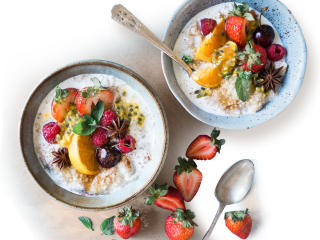
Tips to Manage Stress Eating
Have you ever felt like coming home after a long, stressful day at work and devouring a entire box of cookies or a bag of chips? If so, you’re not alone! Studies show that stressful events (like busy and stressful days at work) activate body and brain systems associated with metabolism, cognition and reward.
What does this mean for your waistline? It means that the candy bar you are reaching for after a stressful event (or a series of stressful events) may be driven by a combination of physiological and psychological factors.
How does stress affect your appetite?

“Studies show that women with high chronic stress levels tend to engage in emotional eating. In addition to psychological responses to stress, there may also be physiological responses. During a stressful event, the body releases cortisol, a hormone that helps the body protect itself. However, if cortisol levels are elevated for a prolonged period of time, such as during repeated and constant stressors, this can lead to increased food consumption, fat storage and weight gain.”-Johns Hopkins research nutritionist, Erin Gager
Does timing matter?
According to a study from the Johns Hopkins Department of Psychiatry and Behavioral Sciences, “timing may play a role in appetite and gut hormone responses to meal and stress challenges. (A challenge is used in research studies to see how people react to different foods or stress factors.) This study showed that the “afternoon/evening may be a high-risk period for overeating, particularly when paired with stress exposure, and for those with binge eating [tendencies].” This means that your commute home or evening meal may be a time period when you have a greater likelihood to eat more than you should.”-Johns Hopkins research nutritionist, Erin Gager
Try preparing snacks in advance to control portion size or even using a food journal to track what you eat, when you eat it, and how much you consume.
Maybe buy pre-cut foods so you eliminate a barrier for yourself. Apples, bananas, hard boiled eggs, pre cut celery, packaged nut butters…. Just quick examples of foods that travel well and require little work on your end.
![]()
![]()

How can you manage stress eating?
– Practice Mindful Eating: Your craving may be a result of a stressful event.
Try the 30-45 minute test. Wait 30-45 minutes before you eat something. Drink some water, decaf tea or coffee and if you’re still hungry after 30-45 minutes then go ahead and eat. You’re just putting a pause between stimulus and response
– Find Healthier Options: After the 30-45 minute test then we want to have a plan for the snack/food we’re going to consume.
Something Sweet:
Cut up an apple and spread some nut butter on it. The combination of carbohydrates, protein, and healthy fat should help curb your appetite and satisfy your need for a sweet snack.
Something Salty:
Consider adding your favorite flavor of hummus to deviled eggs for a unique lower-calorie, high-protein snack option.
– Watch Portion Sizes: Instead of taking the whole box of snacks with you, put a snack-size amount on a plate. Check the package to see what one serving size is, and try to stick to that.
It’s always a good idea to consult your doctor or a dietitian when you make changes to your diet.



